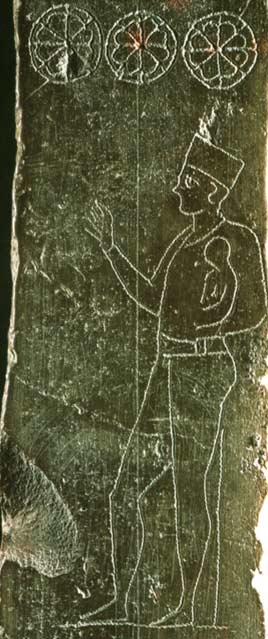The Bible
 When the children of Israel came into the promised land, they
were commanded by God to extirpate the people already living there,
the Canaanites. No human being can lawfully reach such a verdict
concerning an entire race; it was God, the righteous judge of all the world,
who delivered the verdict against them. Their culture was
built around a practice which would make even Hitler blanch: burning
alive infant children as an offering to their gods. When the children of Israel came into the promised land, they
were commanded by God to extirpate the people already living there,
the Canaanites. No human being can lawfully reach such a verdict
concerning an entire race; it was God, the righteous judge of all the world,
who delivered the verdict against them. Their culture was
built around a practice which would make even Hitler blanch: burning
alive infant children as an offering to their gods.
The atheists cry, 'genocide'!:
"The God of the Old Testament murdered innocents by the millions,
commanded the Israelites to commit mass rape and genocide, and
prescribed the death penalty for blasphemy, idolatry, homosexuality,
adultery, talking back to parents, and working on the Sabbath. . ." (Steven Pinker, Enlightenment Now, p. 63 of 146, Part
III, Chapter 23).
But were they really innocent? In some jurisdictions in the U.S., a mother and
a father who had been convicted of incinerating their own children would
be eligible for the death penalty, given the cruelty and depravity
of the act. Is God a monster, as is alleged, for reaching the same
verdict as the justice system of certain American states? In its majority
opinion in Davis v. Beason, delivered in 1890, the Supreme Court
gave notice that would-be revivers of the ancient Aztec faith would
face "swift punishment:" "And history discloses the fact that the
necessity of human sacrifices, on special occasions, has been a
tenet of many sects. Should a sect of either of these kinds ever
find its way into this country, swift punishment would follow the
carrying into effect of its doctrines, and no heed would be given to
the pretense that, as religious beliefs, their supporters could be
protected in their exercise by the constitution of the United
States." (Davis v. Beason, Justice Stephen Field for the majority).
Would even the atheists themselves find the adherents of the Aztec
revival "innocent"?
The idea that people who would do such things should be punished,
shocks the conscience, we are told. But why? The atheists themselves would
demand punishment of the Aztec revivalist:
"But they believe God is too merciful and full of compassion to
punish sin. The drunkard, the harlot, the gambler, the murderer, the
thief, and the man who chases worldly pleasure would all share alike
with the saints at the end. Suppose the governor of your state was
so tender-hearted that he couldn't bear to have a man suffer, couldn't
bear to see a man put in jail, and believed all prisoners should be
set free. How long would he be governor? You would have him out of
office before the sunset." (The Overcoming Life, D. L. Moody, Kindle
location 844).
When men apply the death penalty to the Aztec out of his century,
that's well and good, the atheists would demand no less; but let God try
it, and it's an atrocity. Why? God warned against the practice in His law:
"And thou shalt not let any of thy seed pass through the fire to Molech, neither shalt thou profane the name of thy God: I am the LORD."
(Leviticus 18:21).
"Again, thou shalt say to the children of Israel, Whosoever he be of the children of Israel, or of the strangers that sojourn in Israel, that giveth any of his seed unto Molech; he shall surely be put to death: the people of the land shall stone him with stones.
And I will set my face against that man, and will cut him off from among his people; because he hath given of his seed unto Molech, to defile my sanctuary, and to profane my holy name.
And if the people of the land do any ways hide their eyes from the man, when he giveth of his seed unto Molech, and kill him not:
Then I will set my face against that man, and against his family, and will cut him off, and all that go a whoring after him, to commit whoredom with Molech, from among their people."
(Leviticus 20:2-5).
"There shall not be found
among you any one that maketh his son or his daughter to pass
through the fire, or that useth divination, or an observer of
times, or an enchanter, or a witch, Or a charmer, or a consulter
with familiar spirits, or a wizard, or a necromancer. For
all that do these things are an abomination unto the LORD: and
because of these abominations the LORD thy God doth drive them
out from before thee." (Deuteronomy 18:10-12).
In spite of all these warnings, Israel, which had not carried out the
command in full, kept continually getting infected with
the practice, even kings like Ahaz and Manasseh doing away with their own
children:
"But he walked in the way of the kings of Israel, yea, and made
his son to pass through the fire, according to the abominations
of the heathen, whom the LORD cast out from before the children
of Israel." (2 Kings 16:3).
"And he made his son pass through the fire, and observed
times, and used enchantments, and dealt with familiar spirits
and wizards: he wrought much wickedness in the sight of the
LORD, to provoke him to anger." (2 Kings 21:6).
"They did not destroy the nations, concerning whom the LORD commanded them:
but were mingled among the heathen, and learned their works.
And they served their idols: which were a snare unto them. Yea, they sacrificed their sons and
their daughters unto devils, and shed innocent
blood, even the blood of their sons and of their daughters, whom
they sacrificed unto the idols of Canaan: and the land was
polluted with blood." (Psalm 106:34-38).
"And they have
built the high places of Tophet, which is in the valley of
the son of Hinnom, to burn their sons and their daughters in
the fire; which I commanded them not, neither came it into
my heart." (Jeremiah 7:31).
"They have built also the
high places of Baal, to burn their sons with fire for burnt
offerings unto Baal, which I commanded not, nor spake it,
neither came it into my mind: Therefore, behold, the days
come, saith the LORD, that this place shall no more be
called Tophet, nor The valley of the son of Hinnom, but The
valley of slaughter." (Jeremiah 19:5-6).
"And they built the
high places of Baal, which are in the valley of the son of Hinnom,
to cause their sons and their daughters to pass through the fire
unto Molech; which I commanded them not, neither came it into my
mind, that they should do this abomination, to cause Judah to sin."
(Jeremiah 32:35).
“Moreover you took your sons and your daughters, whom you bore to Me, and these you sacrificed to them to be devoured. Were your acts of harlotry a small matter, that you have slain My children and offered them up to them by causing them to pass through the fire?
(Ezekiel 16:20-21).
"For when ye
offer your gifts, when ye make your sons to pass through the
fire, ye pollute yourselves with all your idols, even unto
this day: and shall I be enquired of by you, O house of
Israel? As I live, saith the Lord GOD, I will not be
enquired of by you." (Ezekiel 20:31).
"That they have
committed adultery, and blood is in their hands, and with
their idols have they committed adultery, and have also
caused their sons, whom they bare unto me, to pass for them
through the fire, to devour them." (Ezekiel 23:37).
We tend to feel that we live in an evil age, and we do; but the
depravity of the societies that existed prior to the flood, or in
Canaan before Joshua's conquest of the land, boggle the mind. God's
desire was to blot out this evil, not out of hatred for humanity,
but out of love:
"You have, no doubt, noticed in the Torah how the
commandment to annihilate the seven nations, and 'to save alive
nothing that breatheth' (Deut. xx. 16) is followed immediately by
the words, 'That they teach you not to do after all their
abominations, which they have done unto their gods: so should you
sin against the Lord your God (ib. 18): that is to say, you shall
not think that this commandment implies an act of cruelty or of
retaliation; it is an act demanded by the tendency of man to remove
everything that might turn him away from the right path, and to
clear away all obstacles in the road to perfection, that is, to the
knowledge of God." (Moses Maimonides, The Guide for the Perplexed,
p. 94).
God has a better plan; He wants us for companions and friends, not as loathsome
insects from which He must turn away. "All this has been ordained in
order that every vestige of that which would lead to great injury
should be blotted out. . ." (ibid., p. 94). He destroyed these
nations because He saw how much better human life can be. He gave them time
to clean up their act, and they would not.

Human Initiative
The atheists reason, that if it is morally permissible for God to strike down entire civilizations
and populations, as the potter can return a marred vessel to its original matrix, then surely human beings
can do the same, upon their own initiative:
|



